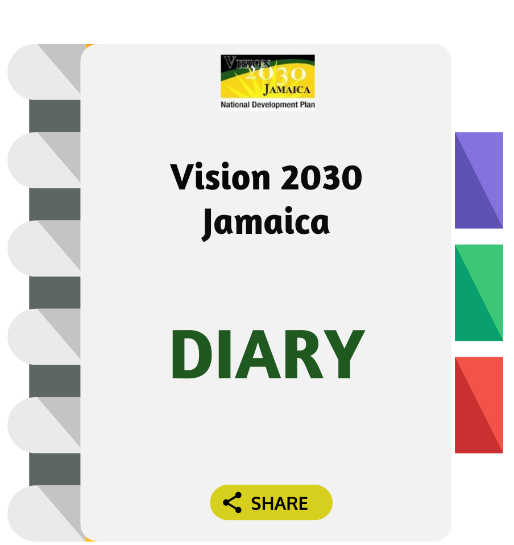Blog
Thoughts for National Development Planning in Jamaica: Lessons Learned in the Global Development Space (December, 2020)

 The year 2020 marked the beginning of the Decade of Action and Delivery for Sustainable Development to accelerate the achievement of the 2030 Agenda.
The year 2020 marked the beginning of the Decade of Action and Delivery for Sustainable Development to accelerate the achievement of the 2030 Agenda.
The impact of the COVID-19 global pandemic has necessitated a transition from the Decade of Action to the decade of recovery. Projections from the UN on the possible impact of COVID-19 suggest that least developing countries (LDCs) and small island developing states (SIDS) will need four to five years to recover. Countries like Jamaica will spend half of the Decade of Action and Delivery attempting to recover to where they were at the beginning of 2020. The potential impact of COVID-19 is compounded by the anticipated negative effects of climate change and an increased likelihood of development-displacing disasters, the closer we get to 2030.
Prior to the onset of the COVID-19 global pandemic, with over 10 years of implementation of Vision 2030 Jamaica – National Development Plan (NDP) and 5 years into the implementation of the 2030 Agenda and its Sustainable Development Goals (SDGs), Jamaica had emerged from the worst effects of the 2008 global financial crisis having secured development gains in critical areas including macro-economic stability, human capital development, governance, and the built environment. There was also progress in the strengthening of the policy and legislative environment across the social, economic, and environmental areas of development.
The COVID-19 pandemic, and the cascading health, economic, social, and political crises have upended many of the prevailing assumptions around development progress and trajectories, further unmasking vulnerabilities and inequalities, globally and nationally. In Jamaica, the economic and social impacts of COVID-19 have led to downturn in key sectors such as tourism, disruption of supply chains, and the exacerbation of social challenges associated with disruptions in social organization and traditional forms of social interaction. The adverse weather-related events in the latter months of 2020 have compounded the impact of the pandemic.
Without pursuing a lengthy historical development analysis, the events of 2020 on their own warrant a reflection on how Jamaica can draw lessons from the global development context. The urgency for risk-resilience in national development planning has never been more essential—Jamaica must capitalize on the Sendai Framework for Disaster Risk Reduction. Disaster risk reduction is an area in which Jamaica needs to build greater resilience and inclusion in support of improved national and global preparedness for future crises. Lack of implementation of the Sendai Framework in the national context undermines Vision 2030 Jamaica and the 2030 Agenda.
One clear lesson the COVID-19 pandemic has taught development practitioners is that development is a complex and emergent process with deep interconnections across the economic, social and political domains. Any assumption of a linear development pathway is archaic and non-progressive. As Jamaica charts its policy and programmatic response to the pandemic, it is cautioned against pursuing a primarily sectoral and siloed approach. This would perpetuate inconsistencies and incoherence in responding to the shocks and emerging challenges which are commonplace in a small island developing state like Jamaica.
A particularly important lesson from the global perspective is a widening of the recognition that per-capita income is no longer a sufficient yardstick for measuring developmental progress. Jamaica has a critical role to play as a small island developing state and middle-income country to advocate for greater urgency and action on the measurement of sustainable development using multidimensional approaches. The centrality of vulnerability within a system of multidimensional risks for SIDS is critical to the development of policies and interventions that treat the interconnections of the COVID-19 and climate crisis, and the potential for the intersections of the two to further push the country to the edge of falling behind. The United Nations General Assembly in December 2020, adopted the resolution (A/RES/75/215)[1] which calls for the Secretary-General to provide recommendations for the “potential development and coordination of work within the United Nations system on a multidimensional vulnerability index for SIDS, including on its potential finalization and use”. This is a fundamental and impactful step in recognizing the specificities and contexts of development in countries like Jamaica which are challenged by their small size, susceptibility to natural disasters, debt burden, shrinking fiscal space and ecological fragility. A multidimensional vulnerability approach will have cascading effects across all sectors of society; strong political ownership of policies and plans is a critical success factor.
With evidence of worsening effects of climate change, the Jamaican citizenry is also called upon to be more resilient in their thinking and actions to stave off the effects. To realize the required mindset change an integrated lifecycle, multimodal, integrated, whole-of-government and whole-of-society approach is needed. The change in behaviour and mindset must match ambitions for sustainable development. Now is the time for policy commitments to be translated into policy actions, particularly at the parish level where the disparities are evident across socio-economic groups, gender, age, and rural-urban divide.
While some events and trends present risks that must be mitigated, they also present opportunities for a more positive outlook to make Jamaica and its people more resilient in times of change. The tools and blueprint for a sustainable recovery from COVID-19 are found in Vision 2030 Jamaica – National Development Plan (NDP) and the 2030 Agenda. Recognizing the complexity and the interconnectedness of the social, economic, and environmental dimensions, transformative actions and integrated systems thinking can position Jamaica to recover better and build a more inclusive, greener, and resilient society and economy. This will not only accelerate COVID-19 recovery but do so in a manner which strengthens against future crises.
The on-going Strategic Review of Vision 2030 Jamaica and the formulation of the new Medium Term Socio-Economic Policy Framework (MTF)[2] will provide an opportunity for Jamaica to strengthen its integrated approach to the implementation of Vision 2030 Jamaica and ultimately the 2030 Agenda for Sustainable Development. We must be prepared to take bold steps in looking ahead to future possibilities for sustainable development in Jamaica and begin to envision the successor to Vision 2030 Jamaica.
[1] “Follow-up to and implementation of the SIDS Accelerated Modalities of Action (SAMOA) Pathway and the Mauritius Strategy for the Further Implementation of the Programme of Action for the Sustainable Development of Small Island Developing States”
[2] The successive 3-year MTF is the strategy-based, policy-driven framework for implementation of Vision 2030 Jamaica and the SDGs.
Written by Toni-Shae Freckleton
Team Lead, Sustainable Development, Office of the President of the75th session of the United Nations General Assembly
December 14, 2020
Up Next: Social Investment in Jamaica’s COVID-19 Response; the JSIF



